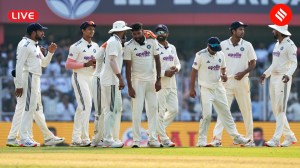Why is the urban voter so angry?
Recent election results have been marked by a palpable indifference, if not hostility, of urban voters towards incumbent governments

The ripples caused by the recent elections in Punjab and Uttarakhand have begun to settle, and attention has shifted to the Municipal Corporation of Delhi (MCD) elections and the likely outcome of the Uttar Pradesh elections.
Election outcomes are rarely yielding decisive conclusions and anti-incumbency is being widely regarded as the preferred option of voters, but there have been many contrary examples of incumbents weathering the anti-incumbency sentiment. And suggestions that inflation, electricity, water, housing are decisive determinants of voter options suffer from oversimplification.
Notwithstanding these ambiguities, election results do suggest a marked indifference, if not hostility, of urban voters towards incumbent governments. In the 2004 Andhra Pradesh elections that ousted the incumbent TDP government, the Congress achieved an average strike rate of 78.23 per cent, but in city constituencies it was 85.71 per cent. Against this, the TDP’s strike rate in cities was 14.2 per cent lower than their average strike rate. In Rajasthan in 2003, the BJP won with an average strike rate of 60 per cent, but it was 86.67 per cent in city constituencies. The Congress scored a strike rate of only 13.33 per cent in cities against its average strike rate of 28 per cent.
In Punjab, the BJP-Akali Dal combine had a strike rate of 80 per cent in cities, far above the average 67.76 per cent. On the other hand, the Congress, could score only 20 per cent in cities against its average strike rate of 37.93 per cent. Similarly, in Uttarakhand, the BJP scored a strike rate of 90 per cent in city constituencies, way above the 49 per cent average. And the Congress scored only 10 per cent in cities against its average of 30.43 per cent.
Ironically, in all these examples, the chief ministers who went out of office felt they had done a lot to improve life in urban conglomerates. Naidu, for example, took pride in giving Hyderabad a new face.
So why are urban voters more intolerant of incumbents? Is it because rural societies have a way of accepting reality, view changes with a degree of indifference, and are less impatient with the pace of change? Or is it that elections generate higher excitement in urban pockets, and consequently set higher threshold of expectations and any disappointment soon turns into concerted anger? Urban pockets, in fact, represent a microcosm of voter preferences and they choose to demonstrate their choice in a more pronounced way. Five years is often considered long enough and the urban electorate opts for a change in government and faces associated with the governance process. The asymmetry of rural apathy and urban anger, given migratory patterns from rural societies to urban conglomerates, highlights the inadequacy of planning and implementation to improve the urban quality of life.
It is well known that brisk urbanisation is yet to begin in India. Improving the pace and contribution of the manufacturing sector will inevitably involve relocating workers currently engaged in agricultural activity. An accelerated pace of urbanisation is an inevitable consequence. Urban planning poses multiple challenges. The Jawaharlal Nehru Urban Renewal Mission (JURM) is a positive but a modest beginning to address India’s urban challenges.
Managing migration in a sensible way involves creating gainful job opportunities in newer urban conglomerates closer to villages. We need a holistic approach to grapple with the broader issue of urbanisation.
Urban voter intolerance needs redressal. We can hardly afford to turn a growing number of people into angry citizens. Anti-incumbency may be healthy for democracy, but igniting urban anger can be dangerous. We need to draw appropriate conclusions from a perceptible bias in voting pattern from several recent elections.






- 01
- 02
- 03
- 04
- 05

























